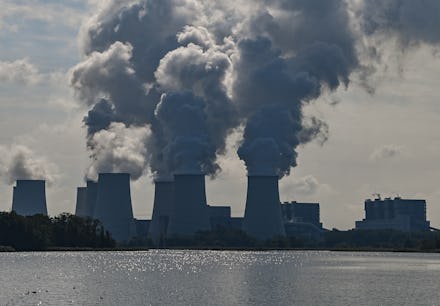Trump puts millions of Americans at risk by allowing coal plants to pollute waterways

On Monday, the Trump administration announced a rollback of environmental regulations that restricted how coal-fired power plants could dispose of wastewater. Under the new guidelines created by President Trump's Environmental Protection Agency, these dirty-burning power plants will now be able to dump wastewater containing dangerous pollutants like lead, selenium, and arsenic into rivers, streams, and other waterways. The change will save the energy industry tens of millions of dollars, but will in turn create new health risks for Americans who will be exposed to the harmful waste.
The rule change takes aim at an Obama-era regulation that put a cap on the levels of toxic metals that coal plants could dispose of. The regulation, put on the books in 2015, was the first new requirement since the 1980s to mandate that coal plants restrict the harmful pollutants that they expelled into public waterways. To comply with the requirements, the rule pushed the plant operators to adopt wastewater treatment technologies, which helped to limit the amount of pollution their facilities released. Under the new, Trump-approved rule, some of the restrictions on pollutants have been rolled back, and compliance dates have been pushed back, allowing many plants to continue operating without taking any action to clean up their act.
Energy companies, which are estimated to save a collective $140 million per year, are sure to celebrate the rule — especially as many appear to be struggling to stay afloat, in part due to the coronavirus pandemic and in part because coal is now more expensive and less efficient than green alternatives like wind and solar power. Trump has made it a top priority to prop up dirty-burning fuel sources, particularly coal, since taking office. His administration has taken action to roll back or completely undo more than 100 environmental regulations — many of which were put in place to limit the pollution and emissions released by coal plants — all while actively hindering clean energy alternatives. Despite Trump's campaign promises to save coal and his administration's ongoing attempts to provide favor after favor to the dying industry, renewable energy is still set to overtake coal for the first time in U.S. history.
But while this change might keep energy companies above water for the time being, it'll have potentially dire effects on millions of Americans. According to a benefit and cost analysis conducted by the EPA when the agency first put the wastewater rules in place back in 2015, as many as 1.1 million Americans live within three miles of coal plants that can release pollutants into a public waterway. The people that live within range of these polluters and are put at risk by the waste dumping practices are often low-income communities with a higher percentage minority population. The Obama administration estimated that its rule change would prevent about 1.4 billion pounds of toxic metals and dangerous pollutants from being dumped into public waterways each year and could save about $480 million per year in medical expenses and other costs that would result from the pollution.
The health effects of exposure to pollutants found in coal plant wastewater are no joke. People can experience increased risks of cancer, a variety of short- and long-term health conditions including diarrhea and a number of dangerous infections, and birth defects that adversely affect child development. Many of the pollutants found in wastewater also do not degrade, meaning their presence will be felt by humans and the ecosystems that exist inside the waterways.
But all of that is apparently immaterial to the Trump administration, which will happily tout the savings for coal companies without recognizing the cost for the rest of us.